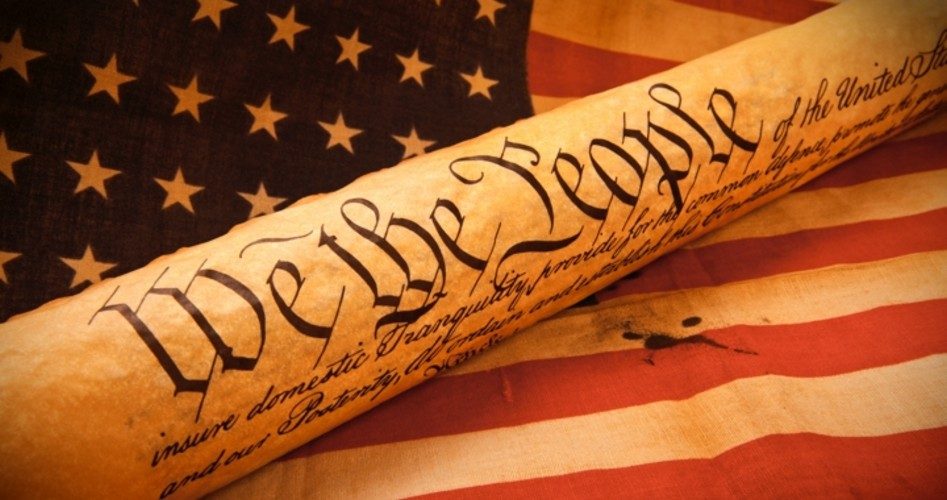
Legislative resolutions in the New Hampshire House of Representatives and the Nebraska Senate (the only legislative chamber in their unicameral system) introduced earlier this month demonstrate powerfully that there is a growing awareness of the dangers posed by any constitutional convention called under Article V of the U.S. Constitution.
The rescission resolution (LR 2) that will be considered by the Nebraska Senate would rescind “any and all” of that state’s previously passed resolutions “petitioning Congress to call for a constitutional convention under Article V of the Constitution of the United States.” In New Hampshire, HCR 1 is “a resolution rescinding all requests by the New Hampshire legislature for a federal constitutional convention.”
New Hampshire’s resolution notes that the Declaration of Independence proclaims that “it is the Right of the People to alter or to abolish” their form of government, adding that this “implies that a convention of representatives of the sovereign people in an Article V ‘convention for proposing amendments’ would have the inherent power to propose sweeping changes to the Constitution,” adding this could lead to a “runaway convention.” Wisely, the New Hampshire resolution notes that “any limitations or restrictions” the states have placed upon any such hypothetical convention could not stop it from becoming a dangerous “runaway convention.”
Such a “runaway convention” has the potential, the resolution asserts, to place in “imminent peril” the rights of American citizens.
“There is no need for, rather, there is a great danger in, subjecting our form of government, which is based on the Declaration of Independence and the Constitution, to sweeping changes that would undermine its philosophical foundation of instituting government based on the principle of securing God-given rights,” New Hampshire’s resolution continued.
Not only does the New Hampshire resolution correctly point to dangers of a constitutional convention, it also offers an alternative: “The best solution for reining in the federal government is an informed electorate which will hold public officials accountable to our existing Constitution with its principles of limited government.”
To make sure that none of New Hampshire’s previously enacted resolutions that have thus called for a con-con are used to bring about such an event, the resolution proposes to “rescind, repeal, cancel, nullify, and supersede” any previous resolutions “as if they had never been passed,” whatever language they had used.
Nebraska likewise has a resolution under consideration to rescind all of its previously enacted resolutions. It specifically cites all previous resolutions since the 1800s, in which a Nebraska Legislature called for a constitutional convention to consider various amendments, and proceeds to rescind them all.
Why has such a resolution been introduced in Nebraska? The rescission resolution expresses the fear that “a constitutional convention convened by Congress could make sweeping changes to the Constitution and threaten the liberty of future generations.”
The rescission resolution draws attention to American history to make its point that a constitutional convention could become a runaway convention. Mentioned in this regard is the convention of 1787 that produced our present Constitution. It was, the resolution correctly notes, “initially convened to make revisions to the Articles of Confederation and this Convention decided instead to discard the Articles of Convention entirely and create a new system of government.”
The Constitution “has served as the cornerstone of American liberty since its creation,” the resolution explains, noting that it has survived “turmoil and grave political and economic concerns,” including “contested presidential elections, the Civil War, the Great Depression.” All of this was accomplished without the calling for another constitutional convention. (James Madison, widely regarded as “the Father of the Constitution,” warned that he feared for the country’s future were we to have another constitutional convention).
Nebraska’s resolution addresses other state legislative bodies, pleading with them to “withdraw such applications” for any con-con request that they may have made in the past.
Likewise, New Hampshire’s resolution asks other state legislatures to nix their past resolutions that have applied for a new constitutional convention — urging them to replace them with rescission resolutions. “The New Hampshire legislature urges the legislatures of each and every state which has applied to Congress to call a convention for either a general or a limited constitutional convention, to repeal, and withdraw such applications.”
Article V of the U.S. Constitution requires Congress to call a constitutional convention upon the application of two-thirds of the several states. However, the Constitution is silent as to how any delegates to such a convention would be selected, or if such a convention could be limited as to its purpose. Do we really want a convention of delegates chosen by the same electorate that put Nancy Pelosi back in power?
Because of this, organizations such as the John Birch Society (parent of The New American), the late Phyllis Schlafly’s Eagle Forum, and a few others have worked diligently to oppose a dangerous constitutional convention. Readers concerned about losing our Constitution, and with it, our liberties, should contact the John Birch Society, and learn how to save our Constitution.
The late Supreme Court Justice Antonin Scalia warned that the 21st century is not a good century in which to write a new Constitution. We should heed his advice.




